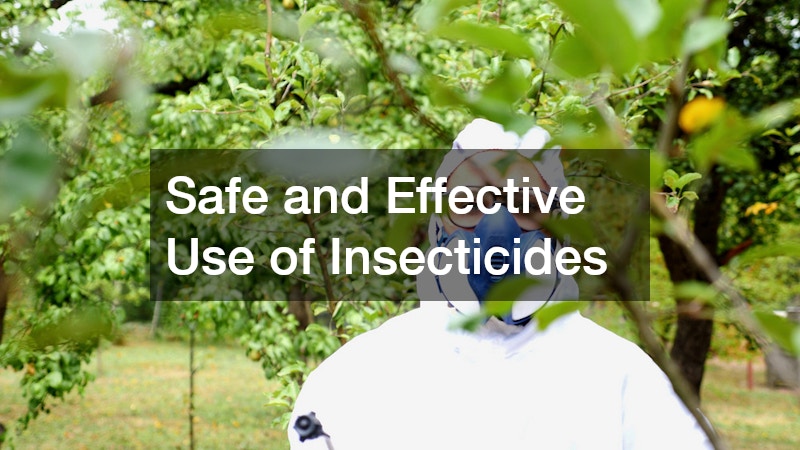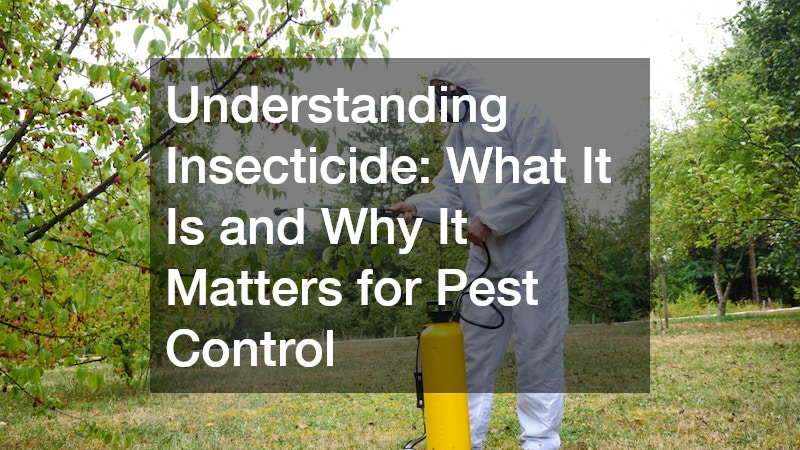Insecticides play a crucial role in managing insect populations that can cause damage to crops, homes, and health. Whether used in agriculture, homes, or public health programs, insecticides help control pests that threaten food production, property, and well-being. But what exactly is an insecticide? How does it work? And why is it so important? This article will explore the fundamentals of insecticides, their types, methods of application, and the importance of professional insecticide solution services.
What Is an Insecticide?
An insecticide is a type of chemical or biological agent specifically designed to kill or manage insects. These substances target various stages of an insect’s life cycle, including eggs, larvae, pupae, and adults.
Insecticides are used to reduce the population of harmful insects such as mosquitoes, termites, aphids, beetles, and many others that can affect agriculture, human health, and property.
Insecticides can be either synthetic chemicals or naturally derived compounds. Their formulation and mode of action can vary widely depending on the insect species targeted and the intended use.
Types of Insecticides
Insecticides can be categorized based on their chemical composition or mode of action. Here are the main types commonly used:
1. Contact Insecticides
Contact insecticides kill insects on direct contact. They are applied to surfaces or plants and affect insects when they come into contact with the treated area. These insecticides can act quickly and are often used in home pest control and agricultural settings.
2. Systemic Insecticides
Systemic insecticides are absorbed by plants and transported through their tissues. When insects feed on the treated plants, they ingest the insecticide and die. These are commonly used in agriculture to protect crops from pests that feed on plant sap or leaves.
3. Biological Insecticides
Biological insecticides are derived from natural materials like bacteria, fungi, or plant extracts. For example, Bacillus thuringiensis (Bt) is a bacterium that produces proteins toxic to specific insect larvae but safe for humans and animals. These insecticides are often used in organic farming and environmentally sensitive areas.
4. Fumigants
Fumigants are gaseous insecticides used to control insects in enclosed spaces like storage warehouses, greenhouses, or soil. The gas penetrates the area and kills insects on contact or ingestion.
How Do Insecticides Work?
Insecticides interfere with essential biological functions of insects, such as their nervous system, growth, or metabolism. Different insecticides use different modes of action:
-
Neurotoxic insecticides disrupt the nervous system of insects, causing paralysis and death.
-
Growth regulators mimic hormones and interfere with insect development, preventing them from reaching maturity or reproducing.
-
Metabolic inhibitors block critical enzyme activity, which leads to the insect’s inability to generate energy or detoxify.
Because insects can develop resistance to insecticides over time, rotating different classes of insecticides or combining methods is often necessary for effective pest management.
Why Is Insecticide Important?
Insecticides have a significant impact on agriculture, human health, and everyday living conditions. Here are some key reasons why insecticides matter:
Protecting Crops and Food Supply
Insects can cause extensive damage to crops by feeding on leaves, stems, fruits, and roots. This damage reduces crop yields and quality, threatening food security. Insecticides help protect crops from pests and ensure a stable food supply.
Controlling Disease-Carrying Insects
Insects like mosquitoes, ticks, and flies can carry and transmit dangerous diseases such as malaria, dengue fever, Lyme disease, and Zika virus. Insecticides are vital in controlling these vectors to reduce the spread of diseases.
Preserving Property
Termites, ants, and other insects can damage wooden structures, furniture, and other materials in homes and buildings. Using insecticides helps protect property from costly and destructive infestations.
Enhancing Comfort and Hygiene
Controlling nuisance insects like cockroaches, fleas, and bed bugs improves indoor comfort and hygiene, reducing the risk of allergic reactions and contamination.
Safe and Effective Use of Insecticides
While insecticides provide many benefits, they must be used responsibly to minimize risks to humans, pets, and the environment. Improper use or overuse can lead to harmful effects such as:
-
Development of insect resistance
-
Harm to non-target species, including beneficial insects like bees and butterflies
-
Contamination of soil, water, and air
-
Health risks to humans through exposure or ingestion
Because of these concerns, insecticide application should follow label instructions and safety guidelines carefully. This is where professional insecticide solution services become invaluable.
The Role of Professional Insecticide Solution Services
Hiring professional insecticide solution services ensures that insecticides are applied safely, effectively, and in accordance with regulations. Experts in pest control understand insect biology, behavior, and the best control methods for specific pests. They have access to specialized equipment and formulations not always available to the general public.
Insecticides are powerful tools in controlling harmful insect populations that threaten agriculture, health, and property. Understanding what insecticides are, how they work, and the importance of using them responsibly is essential. While they play a vital role in pest management, relying on professional insecticide solution services ensures safety, effectiveness, and sustainable pest control outcomes.
If you face insect problems in your home, business, or farm, consulting with experienced insecticide solution services can provide you with the right treatment plan and peace of mind. Through expert application and guidance, insecticides can protect your environment while minimizing risks to people and nature.



